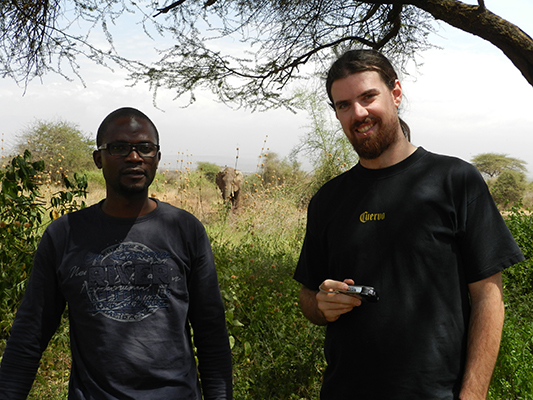George Okwaro: Conservation Management Trainee and Conservation Scholar

Conservation Management Trainees, George (left) and Sam
The undulating hills laced with eucalyptus and Markhamia lutea trees, peaks of granite rocks, and green valleys of corn and Napier grass I see in western Kenya today are now a pale shadow of the lush green hills and valleys, bushy grazing fields, and slowly flowing rivers that adorned the area 31 years ago when l was born.
It is difficult for many people today to detect a bird by its call or a tree by the smell of its leaves, but it is very easy for me. Growing up in rural western Kenya in the mid 1980s, l spent many evenings, weekends, and school holidays in the communal-grazing river valleys looking after my grandfather’s cattle and goats, playing wrestling games, blocking the river for water volumes to rise so I could swim with my peers, and fishing in the wetlands. I loved the experience, especially when we used tree leaves as soap—having been barred from carrying soap from home—hunted with dogs, and scared away the foxes to secure the chickens in our neighborhood.
My love for nature and conservation started during this time. When I was about 8 years old, l used to help my uncle plant trees that he believed were of medicinal value (so that he could access them easily when the need arose). The fact that different birds, snakes, and butterflies had different preferences of trees species just amazed me. Meanwhile, the fact that some water birds migrated from the area after the wetlands were drained, never to be seen again, startled me. The quest to understand why inspired my interest in conservation science.
Touched by the fact that l could no longer see some of the birds that frequented the wetlands and river valleys—and neither would my younger cousins, or son or future grandchildren—I chose to pursue forestry courses in my university education. I believed that if the bushes and forests had not been cleared, then l would still be able to see the unique birds now.
After my studies, I worked with the International Forestry Resources and Institutions, studying how communities shape the forests. In this program, we also helped communities diversify their livelihood means and strengthen their institutional capacity in managing the forests.
Later on l pursued a master’s degree in geographic information science and remote sensing to help in monitoring the effects of our program. After my master’s, l joined the Institutions for Forest Resource and Livelihood Management in East African Forest Landscapes project of Kenya Forestry Research Institute as a research assistant. Now, l have joined AWF to further my dream in conservation. l am learning different approaches of fostering conservation and marvel at AWF’s success stories. l am looking forward to contributing to the important course of conserving wildlife and wild lands in Africa.
This blog is from our Conservation Management Trainee series. Our trainees will be providing you with updates as they progress on their journeys with AWF. To follow them on their travels, read their blogs.